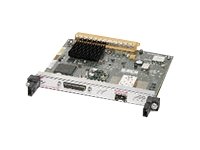


The Cisco 1-Port OC48c/STM16c POS/RPR Shared Port Adapter (SPA1XOC48POSRPR-RF) is an expansion module designed for high-performance, scalable network access. This module provides a single high-speed port, supporting speeds of up to 2.5 Gbps through both OC-48c and STM-16c protocols. It is specifically designed to be used in Cisco's modular carrier platforms, enhancing bandwidth and optimising throughput for both service provider and enterprise environments.
Key network services supported by this adapter include Packet over SONET (POS) and Resilient Packet Ring (RPR), making it suitable for critical applications requiring high connectivity and reliability. POS allows this module to encapsulate network layer packets in SONET or SDH transmissions, enabling highly efficient data transport. RPR technology provides resilience against network failures, ensuring uninterrupted service delivery in high-availability networks.
The module is engineered for a simple, flexible, and high-throughput interface, featuring Cisco’s renowned reliability. In particular, it helps deliver carrier-class performance, which is essential for large-scale data transfer across optical networks. The shared port feature also allows greater scalability, reducing the need for multiple interfaces and simplifying network architecture for those looking to optimise costs and infrastructure use.
Finally, being a Cisco certified refurbished part (denoted by the suffix "-RF"), the SPA1XOC48POSRPR-RF comes with Cisco's stringent testing and qualifications, offering both cost savings and trusted performance for networking equipment. This ensures that while it's a refurbished item, the module continues to deliver reliable performance in demanding network environments.
EOL Technology Services offers professional assistance for the SPA1XOC48POSRPR-RF. Our trained support team helps with product setup, configuration, and troubleshooting. We also provide compatible replacement parts to ensure that your network hardware operates smoothly, even as some products go end-of-life (EOL), maintaining optimal efficiency over time.
Yes, we provide comprehensive maintenance and upgrade services to ensure your IT systems remain up to date and fully operational. From routine checks to part replacements.
Yes, if it isn't the right fit, our team can assist you in identifying the right parts that are fully compatible with your existing hardware.
We can offer a range of payment options, including upfront payment, net payment terms if approved, and bespoke agreements tailored to your requirements.